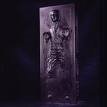 I don't know about you, but I've always had the cinematic picture of God speaking to a bewildered Noah from the clouds, and Noah (played by John Huston) looking around to see where this mysterious voice (I think also played by him) is coming from until he recognizes it as the voice of God.
I don't know about you, but I've always had the cinematic picture of God speaking to a bewildered Noah from the clouds, and Noah (played by John Huston) looking around to see where this mysterious voice (I think also played by him) is coming from until he recognizes it as the voice of God. This is even more enforced by movies like George Burns in "Oh, God!" and the recent "Evan Almighty" where God (in this case Morgan Freeman) has to make repeated special miraculous appearances to convince the hearers that it is, indeed, God who is speaking to them.
This is even more enforced by movies like George Burns in "Oh, God!" and the recent "Evan Almighty" where God (in this case Morgan Freeman) has to make repeated special miraculous appearances to convince the hearers that it is, indeed, God who is speaking to them.Why do we think that when Scripture says God speaks to someone that it must be through some strange or miraculous means? I think it is because we think of God as some kind of distant deity who doesn't have a natural and constant means of connection to His people in this material world.
 Alternately, some people think God exercises a special hot-line connection to them (or visa versa) through emotional experiences, signs, and/or wonders. Well, what do we Lutherans believe? In other words, what does Scripture have to say about this?
Alternately, some people think God exercises a special hot-line connection to them (or visa versa) through emotional experiences, signs, and/or wonders. Well, what do we Lutherans believe? In other words, what does Scripture have to say about this?These are the generations of Shem. Shem was a hundred years old and fathered Arpachshad two years after the flood... [Genesis 11:10]
These genealogies always seem to me like useless tidbits of Biblical trivia at first blush. However, let us consider Luther's commentary on this verse:
Even Abraham was almost swallowed up by the church of Nimrod; but he was called back by the voice of the Lord, who admonished him to separate from the ungodly race and to seek a new abode. I believe that this was done by Shem himself. Since he was the ruler of the church and had the promise concerning Christ, he was held in high esteem by his grandsons; for his ministry was in truth a ministry of God, and what he ordered, his grandsons received as the voice of God.
Thus when it is written that Rebecca consulted the Lord (Gen. 25:22), I think that she consulted Shem himself, whom the Lord wanted to be at the head of the church. For Shem died when Jacob and Esau were fifty years old; and when men who are full of the Holy Spirit speak, it is God who is speaking. At about this time the kingdom of Egypt had its beginning, for the account states that Abraham went down to Egypt.
Hence it is the main point of this chapter to have us realize where the church was at that time, by which fathers it was governed, and finally which fathers were contemporaries.
Luther's Works, Volume 2: Lectures on Genesis (Ge 11:10)
I searched for this Luther quote on my Luther's Works CD (Libronix) after hearing that Luther believed that when God spoke to Noah he did so through Methuselah. Perhaps it's speculative, but according to this theory, God through Adam confronted Cain with the sin of killing Abel, and Abraham was called by God through Shem to leave Ur and go to the promised land. Before we dismiss this as pure speculation, consider that God's Holy Word itself says:
For prophecy was not borne at any time by the will of man, but holy men of God spoke being borne along by the Holy Spirit. [2 Peter, 1:21 - emphasis mine]
Apparently, throughout his commentaries on the Old Testament, at almost every point in history in which God spoke, Luther was able to find a patriarch who was alive and who could speak for God in His place. Peter obviously wouldn't have found this such a novel idea.
So perhaps it's not all that speculative. It is certainly a great comfort to know that God normally uses means to communicate with us. We aren't left (like the enthusiasts and charismatics in our midst think) to try to discern God's voice in superstitious signs and wonders, or in our own sinful hearts and minds.
God gives us parents, brothers, sisters, and godly friends; and He talks to us through them. How much more does he speak to us through the mouths of pastors, who are divinely called and ordained to be preachers and teachers of the Word of God. And, of course, we should always consult Scripture to affirm that what any and all of these messengers tell us is consistent with His infallible Word.
Therefore we ought and must constantly maintain this point, that God does not wish to deal with us otherwise than through the spoken Word and the Sacraments. It is the devil himself whatsoever is extolled as Spirit without the Word and Sacraments. For God wished to appear even to Moses through the burning bush and spoken Word; and no prophet neither Elijah nor Elisha, received the Spirit without the Ten Commandments [or spoken Word]. Neither was John the Baptist conceived without the preceding word of Gabriel, nor did he leap in his mother’s womb without the voice of Mary. And Peter says, 2 Pet. 1, 21: The prophecy came not by the will of man; but holy men of God spake as they were moved by the Holy Ghost. Without the outward Word, however, they were not holy, much less would the Holy Ghost have moved them to speak when they still were unholy [or profane]; for they were holy, says he, since the Holy Ghost spake through them.
[Luther, Smalkald Articles, Part III, Article VIII, 10-13]
...which takes us right back to the motto of this blog from the Large Catechism's explanation of the Fourth Commandment with regard to pastors:
Now, since they are fathers they are entitled to their honor, even above all others. ...those who would be Christians are under obligation in the sight of God to esteem them worthy of double honor who minister to their souls, that they deal well with them and provide for them. ...He who despises and casts this to the winds is not worthy ever to hear a word of God.











2 comments:
Thanks, well written!
You're welcome, Jon. :-)
Post a Comment